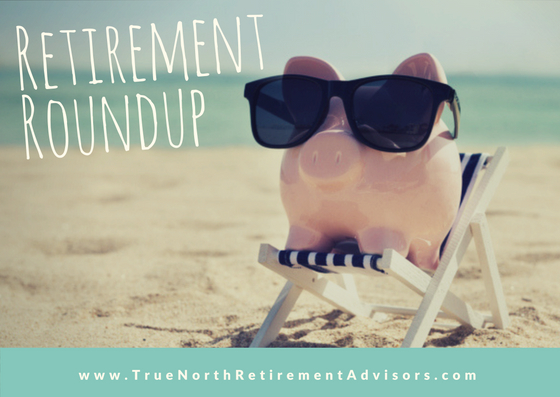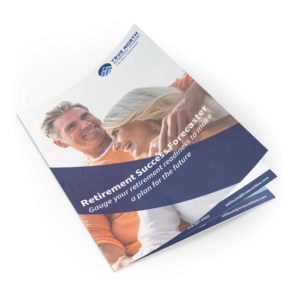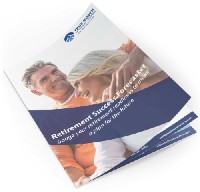Articles and ideas to help you live a fulfilled life!
In this month’s Retirement Roundup, we’ve curated our favorite articles from around the web to help you plan for and live successfully in retirement!
We start off with an interesting article about how working longer actually works better than saving more money – that’s good to know!
We follow that up with the latest Trump tax proposal and what retirees need to know about it. Retirees: pay close attention. If this passes, you will have more flexibility in deciding when and how much of your nest egg to take out.
Then, we switch gears to Required Minimum Distributions (or RMDs). One of the biggest mistakes retirees make is waiting to take their RMDs. RMDs can be very tricky…find out what other mistakes to avoid!
Next, we discuss Google and their success in lowering employee turnover and significantly improving employee satisfaction and performance. With 10 years of research backing their findings, see what the 10 qualities of a good boss they found to be most important.
Lastly, we send you off into your weekend with this, “There is no win in comparison.” You will always be envious if you compare yourself to others with more money than you… but there is a way to change your outlook and be more confident in your financial goals.
Enjoy this month’s installment of the Retirement Roundup!
Working Longer Works Better Than Saving More Money for Retirement
(Robert Powell, TheStreet)
A recent research paper published by the National Bureau of Economic Research found that “increasing retirement saving by one percentage point, ten years before retirement, has the same impact on the sustainable retirement standard of living as working a single month longer.”
In other words, if you decide to save 10% of your income per year, instead of 9% per year, and you increase this 1% savings rate 10 years before retirement, that higher savings rate had the same impact on your portfolio as working for just one more month!
As retirement planners, we understand the impact of working a little longer and what that can do to improve long-term outcomes for clients, but this finding was shocking!
1% more saved for 10 years = just one more month of working!
What’s more, these calculations are based on a wide range of portfolio returns and income levels, emphasizing how the power of working longer applies to a wide spectrum of the population.
The article does acknowledge that working longer isn’t always an option – a large percentage of retirees leave the workforce earlier than planned, most often due to health issues or disability.
This study provides some comfort to 40 and 50 somethings who feel like they are behind on saving for retirement. The impact of working longer, coupled with a commitment to saving more, and delaying social security, all have a substantial impact on one’s ability to live comfortably in retirement.
Curious about the consequences of retiring at different ages? We have the tools to run those calculations for you and show you the impact of retiring at any age!
What Retirees Must Know About President Trump’s Latest Tax Proposal
(Dan Caplinger, The Motley Fool)
Current law mandates that Americans take withdrawals (called RMDs) from Traditional IRA and 401(k) accounts starting at age 70 ½.
An executive order issued last week by President Trump could “loosen the requirements for required minimum distributions, granting retirees more flexibility in deciding when and how much of their nest egg they take out.”
The executive order is aimed at reviewing the rules and the tables used for calculating RMDs – potentially lowering the annual required distribution. Many are hopeful that the outcome will be a removal of the RMD mandate altogether. This seems unlikely, considering the tax revenue that RMDs provide for the government.
For retirees who don’t need to take withdrawals from their IRAs, the potential for lower or no RMDs is exciting! If the RMD rules are relaxed or eliminated, that will mean more years of tax deferral and lower taxes!
It’s not entirely clear whether the Treasury Department could implement the move with a simple rule change rather than getting formal congressional approval. It could be a while, so stay tuned!
10 RMD Mistakes To Avoid
(Kimberly Lankford, Kiplinger)
Rules for RMDs might be changing, but for now, there are still several important considerations when taking your mandatory withdrawals from your IRA or 401(k) once you reach 70 ½.
One of the biggest mistakes that people make is waiting to take their first RMD distribution. The current law states that the first RMD must be taken in the year you turn 70 ½. However, you can actually wait until the following year to take your first distribution. But if you do that, you’ll need to take both years’ RMDs in that second year. Higher distributions in that second year could mean higher taxable income and potentially higher taxes than most people are prepared for.
In addition, “taking two RMDs in one year could bump you into a higher tax bracket and could make you subject to the Medicare high-income surcharge if your adjusted gross income (plus tax-exempt interest income) rises above $85,000 if you’re single or $170,000 if married filing jointly. The extra income could also cause a larger portion of your Social Security benefits to be subject to taxes.” Yikes! That’s a lot of potential negative tax implications if you wait to take your first year’s RMD.
Other common mistakes include:
- Withdrawing the wrong amount (don’t worry, we calculate your RMD for you to help you avoid this mistake)
- Not realizing that the rules vary for IRAs and 401(k)s. For example, each 401(k) account requires a separate RMD withdrawal, and Roth 401(k)s require RMDs. The headaches of multiple RMDs can be resolved by consolidating 401(k) accounts to and IRA at retirement.
- Not understanding the special RMD rules if you work after 70 ½
- Using the wrong procedure to transfer RMDs to charity
Even though the RMD rules can be tricky, it’s important to understand which mistakes to avoid, especially if you plan to work past age 70 ½, delay your first year’s distribution, or use RMDs for charitable giving.
Google Spent a Decade Researching What Makes a Great Boss. They Came Up With These 10 Things
(Justin Bariso, Inc.)
Google has spent the last decade researching the qualities that make a good boss.
According to the article, “In 2008, they began research into what makes a good manager, code-named Project Oxygen. They originally identified eight behaviors that were common among their highest performing managers and began training all managers to develop those behaviors. Over time, Google saw a marked improvement in key metrics such as employee turnover, satisfaction, and performance.”
Here’s are the 10 qualities they found to be most valuable in a good boss:
- Is a good coach
- Empowers team and doesn’t micromanage
- Creates an inclusive team environment, showing concern for success and well-being
- Is productive and results-oriented
- Is a good communicator – listens and shares information
- Supports career development and discusses performance
- Has a clear vision and strategy
- Has key technical skills
- Collaborates across the company
- Is a strong decision maker
Google knows that if they can find and cultivate leaders with the right skills, they will be able to accomplish great things.
If you’re a business owner or an executive charged with managing people, in which of these qualities are you already very strong? Where do you need improvement? How can focusing on what you’re already good at and improving your own skills lead to great things in your business?
Is Instinct Eroding Your Financial Health?
(Sarah Newcomb, Morningstar)
As human beings, it is very natural and innate for us to evaluate ourselves compared to other people in order to judge our progress and position in the hierarchy of the social order.
Recent research from Morningstar shows that:
- People in every income group were more likely to compare themselves to people they see as better off than those they see as worse off.
- Frequent, upward comparisons such as this were associated with higher financial stress, lower satisfaction, lower savings and overall more negative feelings about one’s own financial life.
Their research concludes that how we compare ourselves to others could be a very important measure of financial health.
There was a small subset of people who reported feeling positive about their money regardless of whether the people they compared themselves with were better or worse off.
The differentiating factor for these individuals was not comparing themselves to those around them (friends, family, neighbors, etc), but comparing themselves to a financial role model or mentor instead.
In a follow-up study to further test this finding, Morningstar found that “the people who chose a role model were significantly more likely to report being confident about their ability to reach their financial goals than those who made their normal social comparisons.”
Several years ago, I read the bestselling book The Purpose Driven Life by Rick Warren. One of the lessons that has stayed with me from this book is that there is “no win in comparison”.
What the author meant is that if you compare yourself with someone who is more successful than you, you’ll be full of envy. If you more successful than they are, you’ll be full of arrogance and pride. Either way, comparing yourself to others, is destructive for our character, our relationships, and our happiness.
Understanding the “comparison trap” and directing comparisons to a role model instead can help overall financial health, as well as keep us from the poisonous effects of envy and pride in our lives.
Quote of the Month

Thanks for reading this month’s Retirement Roundup!
Did you enjoy reading this? Do you want more content like this delivered to you each week?
Click here to subscribe to our newsletter >>
Not yet a client? Want to talk about how we can help you reach your retirement goals? Schedule a 15-minute call with us! It’s free – no pressure, no sales pitch.



